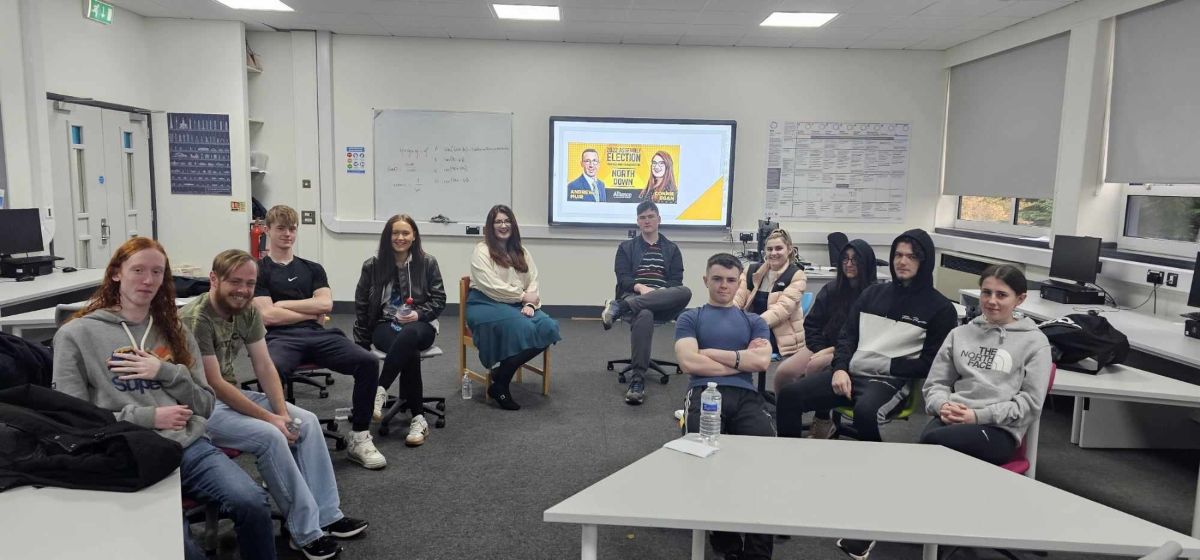Ulster University Foundation Degree in Computing
The Foundation Degree (FdSc) in Computing aims to develop industry current skills to ensure that the future needs of the IT sector are fully met. This qualification will provide you with knowledge and practical experience in programming, networking, database design and development as well as other core skills required for employment within the computing industry.
The Foundation Degree provides you with an opportunity to undertake a structured work- based learning placement within the computing industry during the final year of the programme. It is the responsibility of the student to obtain a suitable work placement employer; however, assistance will be provided by the college as required.
This course will grant you the status of Ulster University Associate Student.
This programme is based on a hybrid learning model with a focus on face-to-face delivery.
Compulsory Modules (All Campuses studied over a 3-year period):
- Mathematics for Computing
- Programming Fundamentals
- Object-Oriented Programming
- Computer Technologies
- Database Design
- Web Development
- Cyber Security
- Work Based Learning
Optional Modules
Students must also undertake a further 60 credits’ worth of optional modules (listed below). Currently, the optional modules are structured into two distinct pathways; however, it may be possible to study modules from both paths depending on timetable constraints.
Optional modules will be a choice of:
Pathway 1 – Programming
- Event Driven Programming
- Mobile Applications
- UX Design
Pathway 2 - Infrastructure
- Introduction to Networking
- Wide Area Networking
- Internet Server Management
In addition to the above units you will also work towards a Professional / Personal Development qualification and will be involved in a range of activities designed to improve employability within the IT sector
Please note, course fees are payable in each year of the programme.
General Entry Requirements
The general entry requirements below identify the minimum qualifications needed to apply for the programme.
Other qualifications will be considered on an individual basis on application.
You are required to upload a copy of your qualification certificates to show how you meet the entry requirements for the programme prior to enrolment.
Applications will also require successful completion of the admissions process.
GCSE/ Level 2 Requirements
• GCSE grade C/4 in English Language, or Level 2 Certificate in Essential Skills Communication, or equivalent in an approved alternative qualification.
AND
• GCSE grade C/4 in Mathematics, or equivalent in an approved alternative qualification.
AND
• 2 at GCSE level (grades A*-C*/9-4), or equivalent in an approved alternative qualification.
Course Entry Requirements
A minimum of 48 UCAS Tariff points including:
• GCE A level (A2): Typical grade profile CC
OR
• [RQF] Pearson BTEC Level 3 Extended Diploma in with overall award profile MPP
OR
• [RQF] Pearson BTEC Level 3 Diploma with overall award profile MM
OR
• Access to HE Diploma (NI): 45% overall and 45% in level 2 Access Mathematics.
OR
• An equivalent in an approved alternative qualification.
Admissions Successful completion of the Admissions Process.
Accreditation of Prior Learning
Alternatively, you can provide evidence of your ability to undertake the programme by meeting the requirements for the Accreditation of Prior Learning (APL) process, either through Accredited Prior Certificated Learning (APCL) or Accredited Prior Experiential Learning (APEL).
Further details on APL can be found in the HE Admissions Process section of our website and the HE Accreditation of Prior Learning SOP.
International Students English Language Requirements
International applicants, from Non-Native English speaking countries, must have evidence of English Language Level B2 on the Common European Framework of Reference for Languages:
• IELTS 6.0 (Academic) (minimum of 5.5 in all skills)
• PTE Academic 51 (minimum of 46 in each part)
• Or equivalent UKVI-approved English Language Test
For further information please contact our International Department at international@serc.ac.uk
Students are assessed using a range of different methods. These include examinations, coursework, project based learning, presentations, practical, posters, leaflets, role-play, and case studies. This is dependent on the requirements of each unit of study. Oral, written and online feedback will be provided during your course to help improve and monitor performance.
The course provides the opportunity to undertake a 12-week placement within the computing industry to assist you in developing real-life experience and practical skills that employers want.
You will learn transferable skills such as communication, organisational skills, problem solving and critical thinking which will help you to apply for relevant jobs within the computing industry. The programme is designed to facilitate your development of a range of graduate qualities that are highly valued in the workplace.
Enquiries Information
For more information or help with this course send us an enquiry and a member of our team will get back in touch.
Available Sessions
Sorry you cannot currently apply online for this course.
For more information or help with this course please complete an enquiry form.
Customer Enquiries
Need more information or have a question about this course? Send us a message below and we will get in touch.
Start New EnquiryTerms & Conditions
Students will be required to comply with SERC's Terms & Conditions of study.
We strive to ensure the description of courses on SERC's website and in publications is accurate. However, for various reasons there may be occasions when the College may need to change arrangements or be unable to deliver classes due to circumstances such as reduced funding. If there are insufficient numbers applying for a course it may not be viable to deliver the class.
Courses are continually reviewed to take advantage of new teaching approaches and developments in research, industry and the professions. Please be aware that modules may change for your year of entry. The exact modules available and their order may vary depending on course updates, staff availability, timetabling and student demand. Please contact the course team for the most up to date module list.
In addition to the above Terms & Conditions students must also adhere to the following:- Comply with College Policies and procedures
- Submit all coursework and assessments by specified dates, coursework submitted without prior consent after the deadline shall not normally be accepted
- Pass all modules in each year of study in order to proceed to the next year of the programme. *The minimum overall pass mark of 40% is required to be achieved in all modules.

Higher Education
If you have just completed your A-Levels, Higher Education is most likely the option for you. HE usually covers HNC, HND & Foundation Degree level of courses including our Higher Level Apprenticeships.
Explore Higher EducationLatest Events
Stay connected to SERC: Your guide to upcoming college events!






